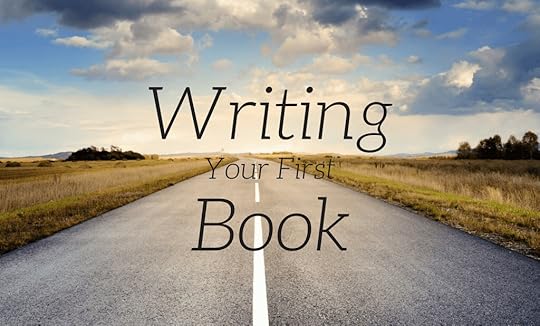Writing Your First Book
 Today is January first, and that means that many of us are bravely declaring our New Year's resolutions. Exercise more. Eat healthier. Write a book—write a book? That may not have been on your list, but I'll assume the persona of Mary Poppins for a moment and agree that writing your first book is a most excellent New Year's resolution indeed. I'm glad you thought of it.
Today is January first, and that means that many of us are bravely declaring our New Year's resolutions. Exercise more. Eat healthier. Write a book—write a book? That may not have been on your list, but I'll assume the persona of Mary Poppins for a moment and agree that writing your first book is a most excellent New Year's resolution indeed. I'm glad you thought of it.And why shouldn't it be a New Year's resolution? So many of us have thought that one day—one day—we'll put pen to paper and do the thing. Open a document and type, "Chapter 1." Create worlds. Breathe life.
The only problem is figuring out how to get to Chapter 1, and that depends on your style of writing. Over the years I've gone from the poster-child for pantser kind to a more meticulous plotter, but either way works. I would even venture to say that flying by the seat of your pants is a very good way to write your first book, but if you're a person that likes everything orderly, that might just drive you crazy. There are pros and cons to both methods.
Pantsers: (writer lingo for a person that.. well... doesn't plot much) write whatever comes to them in the moment. Whatever happens next happens next because it was the inspiration they had. It's a very free and exciting way to write, but you also run a huge risk of hitting writer's block (AKA having no idea what to write next).
Plotters: They do exactly what their name suggests. They plot. They know what happens next from the moment they begin writing, and though they are still susceptible to writer's block, the chances are lower. The cons come when you plan too much, and since you already know everything, you may (like me) lose the desire to write the story.
Of course not everyone falls entirely in one camp or the other, but it's a starting place. And after Chapter 1? Write your idea. If you don't have one yet, I'll let you in on a little secret: they're everywhere! Books, movies and music are some of my favorite sources of inspiration, as are aptly-named writing prompts. But story ideas go so much deeper than that. The rustle of a breeze in the treetops. The cry of a newborn baby. A photograph of a smile from the '20s. Life. Death. That little chill that runs down your spine every so often. Unfulfilled hopes. Dreams come true. The way the steam escapes a mug of coffee on a cold morning. Sunrises, sunsets. The years slowly drifting by, and the changes time brings.
Once you've started, you may realize that writing a book is a lot harder than it looks. That's because it is. It isn't easy—it never has been. The important thing is to keep going even when the going gets tough. To find ways to build bridges over the Chasms of Despair, Doubt, and Plot Hole. If ever you find yourself getting stuck, drown yourself in the things that inspire you.
Writers write, so as long as you get that first draft down, you've won. You're a writer. I'll say it again—writing a book isn't easy. But what New Year's resolution is?
Published on January 01, 2017 17:32
No comments have been added yet.



